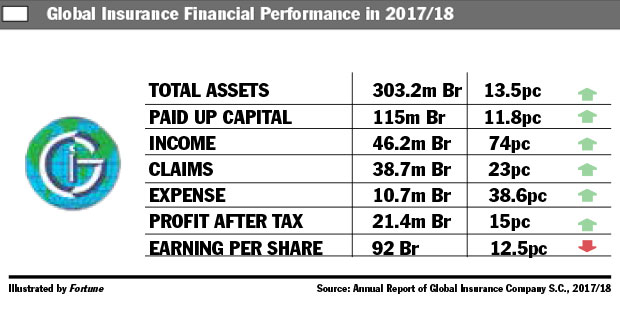
Fortune News | Jan 02,2021
Jun 8 , 2024
By Yehualashet Tamiru
Imagine a shareholder in a private limited company who faces financial difficulties and defaults on a loan. The creditor, seeking to recover the loan, moves on to sell the pledged shares. The existing shareholders, valuing their personal association and control, invoke their preemption rights to prevent an outsider from entering the company. It becomes a delicate equilibrium between maintaining corporate integrity and fulfilling creditor rights, writes Yehualashet Tamiru.
In the intricate realm of corporate law, conflicts often emerge between shareholders' preemption rights and secured creditors' priorities in the event of a share sale. The corporate structure becomes detrimental when a shareholder defaults and a creditor opts to sell the pledged shares.
In private limited companies, which value personal associations, existing shareholders' preemption rights take precedence, requiring their consent for any outside transfer. Conversely, in share companies that focus more on capital, the secured creditors' rights prevail, allowing them to sell or retain the shares without needing shareholder approval. This delineation should show the importance of understanding corporate governance principles in share pledges and transfers.
Most memoranda of association stipulate shareholders' preemption rights. If shareholders wish to sell and transfer all or part of their shares, they must notify the other shareholders and the company in writing. This notice is a binding offer to sell the shares to the other shareholders at the price the selling shareholder is willing to accept.
Consider a scenario where the shareholder defaults on obligations outlined in the underlying contract, and the secured creditor opts to sell the shares in a commercially reasonable manner. The creditor, exercising priority rights, decides to retain the shares. Here, a conflict arises between the preemption rights of the existing shareholders and the secured creditor.
Who should prevail in such a scenario?
To determine priority, one must consider the nature of the business organisation. In a private limited company (PLC), which is an association of persons and capital, the transfer of shares to outsiders requires the consent of a qualified majority of existing shareholders. This reflects the desire of existing members to avoid inviting third parties without prior approval. In contrast, a share company, primarily an association of capital, does not require the consent of existing shareholders to transfer shares to outsiders.
The Commercial Code further reinforces this distinction. When shares are pledged in a liability-limited company, the right to vote at meetings remains with the pledger unless otherwise stipulated. This protects the existing members' preference to keep control within the current group. Conversely, in a share company, the voting right is given to the pledgee, reflecting the company's focus on capital rather than personal association.
If the pledged shares belong to a private limited company, the priority should go to the existing shareholders rather than the secured creditor, respecting the personal association's integrity. If the shares belong to a share company, the secured creditor's rights should precede the preemption rights of existing shareholders.
This framework ensures that the nature of the business organisation dictates the resolution of conflicts between shareholder preemption rights and secured creditor priorities. It demonstrates the importance of understanding the underlying principles governing different types of corporate entities to effectively navigate the complexities of share pledges and transfers.
A share represents the defined interest of shareholders in a company, making it a valuable asset that can be pledged as collateral. Pledging shares involves transferring the possession of the shares to the creditor to secure the performance of an obligation. A security right is established through a security agreement, provided that the grantor has the right or the power to encumber the asset.
The agreement must clearly describe the secured obligation and the collateral property.
A secured creditor with a security right in a share enjoys the benefits of any personal or property right that secures or supports the payment or other performance of the collateral without needing a new act of transfer. There are two ways to secure a pledge over a share: by registering the notice in the official registry for movable property security or, if either party is operating outside Ethiopia, by taking possession of the share certificate. If either the pledgee or the pledger operates outside Ethiopia, the registry will not perfect the security. Thus, when one of the contracting parties operates internationally, the only option to perfect the pledge over the shares is by taking over the share certificate.
The Commercial Code distinguishes who can vote in company meetings if shares are pledged. In share companies, the pledgee exercises the right to vote at meetings unless otherwise agreed. In private limited companies, the pledger typically exercises the voting right unless there is an agreement to the contrary. Suppose the debtor fails to fulfil obligations according to the contract. Enforcement can proceed through the private disposition of the shares, provided default notice and notification of private disposition of the collateral are given. The sale is conducted in a commercially reasonable manner, depending on what is considered commercially reasonable.
Such nuances show the broader regulatory landscape within which companies operate, emphasising the balance between protecting existing shareholders' interests and honouring the rights of secured creditors. In a global context, especially with parties operating across borders, these distinctions become crucial in determining the enforceability and priority of security interests in shares.
PUBLISHED ON
Jun 08,2024 [ VOL
25 , NO
1258]

Fortune News | Jan 02,2021

Editorial | Aug 16,2025

Editorial | Apr 09,2022

Fortune News | Aug 04,2024

Commentaries | Oct 03,2024

Viewpoints | Apr 02,2022

Radar | Jul 23,2022

Commentaries | Feb 18,2023

Fortune News | Aug 31,2020

My Opinion | Apr 22,2023

Photo Gallery | 177165 Views | May 06,2019

Photo Gallery | 167376 Views | Apr 26,2019

Photo Gallery | 157995 Views | Oct 06,2021

My Opinion | 136963 Views | Aug 14,2021
Commentaries | Oct 25,2025

Dec 22 , 2024 . By TIZITA SHEWAFERAW
Charged with transforming colossal state-owned enterprises into modern and competitiv...

Aug 18 , 2024 . By AKSAH ITALO
Although predictable Yonas Zerihun's job in the ride-hailing service is not immune to...

Jul 28 , 2024 . By TIZITA SHEWAFERAW
Unhabitual, perhaps too many, Samuel Gebreyohannes, 38, used to occasionally enjoy a couple of beers at breakfast. However, he recently swit...

Jul 13 , 2024 . By AKSAH ITALO
Investors who rely on tractors, trucks, and field vehicles for commuting, transporting commodities, and f...

Oct 25 , 2025
The regulatory machinery is on overdrive. In only two years, no fewer than 35 new pro...

Oct 18 , 2025
The political establishment, notably the ruling party and its top brass, has become p...

Oct 11 , 2025
Ladislas Farago, a roving Associated Press (AP) correspondent, arrived in Ethiopia in...

Oct 4 , 2025
Eyob Tekalegn (PhD) had been in the Governor's chair for only weeks when, on Septembe...

Oct 25 , 2025 . By YITBAREK GETACHEW
Officials of the Addis Abeba's Education Bureau have embarked on an ambitious experim...

Oct 26 , 2025 . By YITBAREK GETACHEW
The federal government is making a landmark shift in its investment incentive regime...

Oct 26 , 2025 . By NAHOM AYELE
The National Bank of Ethiopia (NBE) is preparing to issue a directive that will funda...

Oct 26 , 2025 . By SURAFEL MULUGETA
A community of booksellers shadowing the Ethiopian National Theatre has been jolted b...